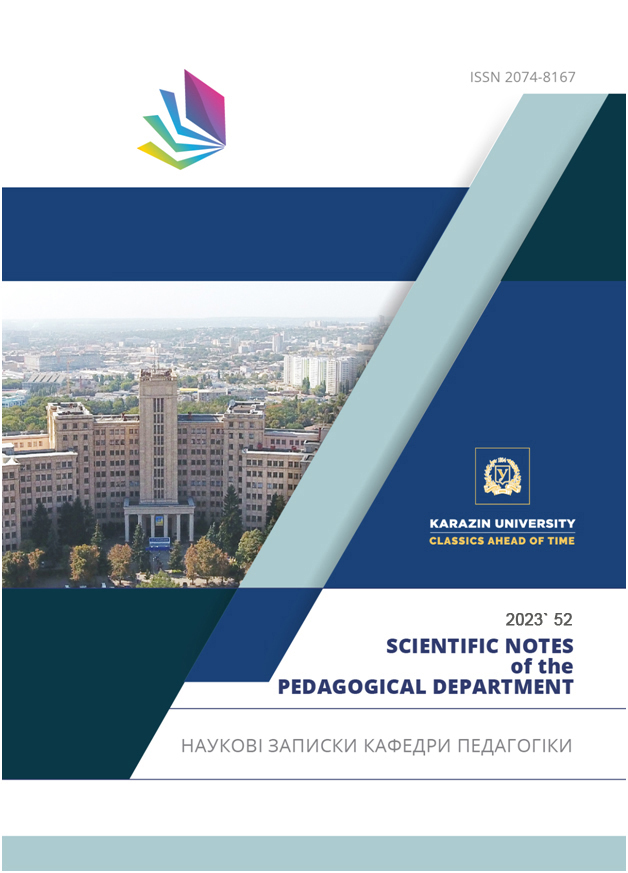Шляхи організації освітнього процесу академічно обдарованих студентів в закладах вищої освіти Китаю
Анотація
B процесі діяльності з виявлення здібних і академічно обдарованих студентів в ЗВО Китаю і учнів в середній загальноосвітній школі можливо йти у кількох напрямках:
Перший з них – діагностика здібностей у студентів, яких ми відносимо до академічно обдарованих.
Другий напрямок в дослідженні вчених, пов’язаний із знаходженням критеріїв обдарованості,
заснований на трьох складових сферах особистості – когнітивної, емоційно-ефективної і психомоторної.
Завантаження
Посилання
Alfimov, V. M. & Perepadia, D. O. (2020). eculiarities of training teachers to work with gifted children in the People’s Republic of China. Spirituality of the individual: methodology, theory and practice. 97, 4. 6-16. [in Ukrainian].
Ievtukh, M. B. (2017). Giftedness: approaches to finding out the essence. Pedagogical almanac. 36. 10-19. [in Ukrainian].
Muzyka, O. O. (2017). Axiogenesis and the development of self-efficacy of students with signs of giftedness. Actual problems of psychology: Collection of scientific works of the Kostyuk Institute of Psychology of the National Academy of Sciences of Ukraine. 6, 16. 181-192. [in Ukrainian].
Naumenko, S. S. (2021). Origins of the idea of education and upbringing of gifted children in China. Theory and methodology of education and upbringing. 50. 136-143. [in Ukrainian].
Naumenko, S. S. (2021). Pedagogical dimension of the concept of giftedness in the People’s Republic of China. Scientific journal of the Black Sea Research Institute of Economics and Innovation. Series: “Innovative pedagogy”. 35. 40–44. [in Ukrainian].
Naumenko, S. S. (2021). Specialized educational institutions for gifted children of the People’s Republic of China. [in Ukrainian].
Perepadia, D. O. (2013). Stimuli for the development of giftedness in children in China. [in Ukrainian].
Poluboiaryna, I. I. (2020). Musical giftedness in the works of foreign researchers. Professional Art Education. 1(1). 17–22. [in Ukrainian].
Chen T. (2016). Comparison of the characteristics of formal and informal education. Bulletin of Nanjing Pedagogical University. 3. 12-16. [in Ukrainian].
Chzhan M. (2013). Scientific understanding of the status and role of non-formal and additional education.
Chinese Academic Journal of Education. 3. 11-15. [in Ukrainian].
Dai, D.Y. & Steenbergen-Hu S. (2015). Special class for the gifted young: A 34-year experimentation with early
college entrance programs in China. Roeper Review. 37, 9–18.
Dai, D.Y., Steenbergen-Hu, S. & Yang, Y. (2016). Gifted education in Mainland China: How it serves a national interest and where it falls short. Gifted education in Asia: Problems and prospects. Charlotte NC. Information Age Publishing. 51–76.
Gong, H. & Lei, J. (2015). The progress and enlightenment of psychological researches on supernormal children. A Journal of Modern Special Education. 4. 23–29.
Jia, Q. & Ericson D. P. (2017). Equity and access to higher education in China: Lessons from Hunan province for university admissions policy. International Journal of Educational Development. 52. 97-110.
Kitano, M. K. (2021). Issues in research on Asian American gifted students. Special Populations in Gifted Education. 3-25.
KPMG. Education in China. URL: https://www. kpmg.de/docs/Education-inChina-201011.pdf (дата звернення 06.01.2023).
Rimm, S. B., Siegle, D. & Davis, G. A. (2018). Education of the gifted and talented. Boston. 233-236. 18. Tran, H. N. et al. (2021). Principal Leadership and Teacher Professional Development in a Vietnamese High School for Gifted Students: Perspectives into Practice. European Journal of Educational Research. 10, 4. 1839- 1851.
Wang, J. & He J. (2013). Innovative perspectives and scientific nurturing of talents – a brief introduction to the gifted education of Beijing no.8 high school. Education of Innovative Talents. 28–31.
Zhang, B., Li, J. & Xu, C. (2014). The developmental differences of problem solving ability between intellectually-gifted and intellectually-average children aged from 11-14 years old. Acta Psychologica Sinica, 46. 1823–1834

